- Home
- Todd Strasser
Summer of '69 Page 13
Summer of '69 Read online
Page 13
“Tell your father to get Alan out of the tub.” I’ve just started another letter to Robin when Mom knocks on my door. This isn’t the first time I’ve been assigned interparental messenger duty, but this summer it’s been a nearly permanent position.
Alan used to hate baths. As a kid he could go months without one and never smell too bad, except for his feet, which Mom would periodically scrub while he stood ankle-deep in the tub.
But about a year ago, around the time he turned fourteen, body odor discovered him. Now about once a week Mom bribes him with Three Musketeers bars. The funny thing is, once you get him into the bathtub, he always wants to stay. Getting him out has become the paterfamilias’s job.
I climb the attic stairs. On a rainy evening like this, I’m surprised to find Musclini shirtless, his skin glimmering with sweat. Free weights and barbells are scattered about the rubber mat on the attic floor, but right now he is straining against an immobile bar in the wooden isometric rack. At five foot ten, he’s more lean than brawny. He does lots of reps for strength and endurance, thus his muscles aren’t he-man bulky. Better for tennis, he says.
When I was around nine or ten, I got into my first real fight and came home with a split lip and a large reddish bruise on my left temple. (The only punch I remember landing got the other kid in the ear.) Dad told me that growing up he’d been a skinny, frail kid and was beaten up regularly. It got so bad that his mother begged the school to let Dad out five minutes early each day so he’d have a head start before the bullies came after him. I was shocked to hear that. In our house, he’s always been the ultimate physical enforcer. It was hard to imagine that he might have once been on the receiving end.
After the fight, I asked the paterfamilias to get me a chin-up bar because Cousin Barry had one and he was strong. Dad was thrilled. He was always trying to get me to exercise. Always encouraging me to lift weights, to do “isometric” exercises on this thing that looks like a wooden torture rack. He never came right out and said that it worried him that I was soft and weak as a kid. But so much of what he did implied it.
Now, in the attic, Musclini stops straining against the torture rack. I relay Mom’s message about getting Alan out of the tub and head back downstairs to my room.
When I got home from work today, there were new items on my desk. Mom left an article reporting that enlistments fell far short of the army’s goal last year (Hell no, we won’t go). In the margin, in blue fountain-pen ink, my mother’s slim script: “Won’t they have to make up the shortfall by increasing the draft?”
And the paterfamilias left a Department of Motor Vehicles change-of-address form with my name and the address of the apartment in Bay Shore filled in. Paper-clipped to it is a note “From the desk of Richard Baker” ordering me to “sign immediately.” I wonder what he’s up to with this change-of-address stuff. No point in asking. He would have told me if he wanted me to know. I sign the DMV form in the hope that it will mean the government will have a few less tax dollars to spend on napalm.
As far as increasing the draft, it’s hard to know what the government is up to. Last month Nixon declared that the United States would soon begin drawing down the number of troops in Nam, but that hasn’t started yet. On the other hand, nearly two hundred thousand men have been inducted (they either enlisted or were drafted) this year, and it’s only July. That’s the second-highest pace of any year since the Korean War. With fewer and fewer men enlisting voluntarily, there’s only one way to fill the ranks: the draft.
A shout echoes through the house, followed by Alan’s cry. I’m out of my room and trotting down the hall when Musclini storms out of the bathroom, still bare-chested, his face red and glistening from his workout. Alan’s in the tub bawling. Floating in the water around him are three brown turds.
It’s gross, but it’s Alan. Who knows why he did it. Maybe he had to go, and rather than get out of the tub and sit on the toilet wet and shivering, he figured it was easier in the tub. Or maybe he was curious to see what would happen. He’s always been a barometer of the family’s moods; maybe he’s acting out because he can feel the mountains of tension around here.
But there’s nothing malicious about what he’s done. For all I know, taking a dump in the tub is the kind of thing a lot of kids try once. Including some who don’t have anything wrong in the head.
But it’s set Musclini off. And here he comes stomping back down the hall with the wooden paddle.
“Richard, what are you doing?” Mom shouts, following.
The only thing standing between Musclini and Alan is me, in the bathroom doorway. It’s been so long since he’s spanked Alan that I’m shocked he still has the paddle.
“Out of the way!” he shouts.
Faced with such patriarchal fury, the ingrained impulse has always been to cower and obey. But tonight the opposite reaction unexpectedly blossoms. Maybe it’s because this is ridiculous. Alan’s not a little kid anymore. Maybe it’s because I can’t stand by and let my brother be a punching bag. I’m bigger, taller, and weigh more than Musclini. What’s he going to do if I don’t get out of the doorway? Hit me with the paddle?
Musclini stops in the hallway, as if expecting me to clear the path. But something inside won’t let me. Whatever’s causing my defiance, it feels like the blood in my veins has been replaced with pure adrenaline. If I had a fuse and someone lit it, I’d probably rocket straight through the ceiling.
Breathing hard, the vessels in his reddened temple pulsing, Musclini’s expression gradually morphs from fury to something akin to stupefaction. My heart is galloping, and I’m holding my breath. I’ve never stood up to him physically before. Never thought I could stand up to him before. But strangely, while my heart knocks anxiously and my lungs cry for air, this feels like the culmination of something that’s been festering for years. It occurs to me that I might even have red-eyed Pagan’s Clyde to thank; if I managed to live through what happened in Central Park, then surely I can survive whatever my father might do, right?
Musclini tilts his head to the side, his consternation melting into something almost akin to curiosity. Is he also realizing that a balance between us has changed? That he may be the father and the boss, but his rulership by force need no longer be tolerated?
Into the space between us steps Mom, as stern as an old-fashioned schoolmarm. “Go away, Richard,” she orders.
Musclini’s tensed shoulders stoop. His eyes meet mine, and he nods as if saying, Okay, you win this round. He turns, retreats down the hall.
As Mom goes into the bathroom and opens a towel for Alan, she looks over her shoulder at me. “Thank you, Lucas.”
Alan steps eagerly into the towel, and she wraps it around his shoulders and rubs reassuringly. I wander back down the hall toward my room, feeling a spectrum of emotions: relief, incredulity, pride. What just happened, wherever it came from, wasn’t an act. It felt like it sprang from some conviction that’s slowly been germinating inside. Something that may have begun as an abstract opposition to the oppression of the masses and a faraway war but feels like it’s spread to a sense of outrage against injustice for the oppressed everywhere. Even before the floating turds, I could tell Musclini was angry about something tonight. It felt right to protect Alan. The war really has come home.
“How long will it take to get there?” Tinsley’s hand is on my thigh. I glance at Cousin Barry in the passenger seat of Odysseus. He’s smoking and gazing out the window through a pair of aviator sunglasses.
“Figure nine hours,” I reply. Physics alone cannot explain the degree of warmth I feel at the spot where Tinsley’s hand lies. She is kneeling in the space between the front seats. She seems to enjoy tucking herself into small places like some sinuous feral creature looking for a spot where she can feel secure.
Barry looks down at her hand on my thigh. Behind the aviator glasses, his expression is unreadable. We are headed toward Ottawa.
An hour ago, on the way to Barry’s house, I stopped at a gas statio
n and picked up a case of SAE 30 motor oil. When I bought Odysseus last March, the previous owner warned me that it had a slow oil leak and needed an additional quart every couple of hundred miles. The trip from Long Island to Lake Juliette and back will be about a thousand miles, so I’ve stocked up.
From the gas station, I drove to Barry’s. When I pulled into the driveway, he yelled down from the window of his room that he was still getting his act together. I went around to the back of the van, opened the engine compartment, and checked the dipstick. The oil level was low.
I’d just finished adding more when Tinsley came out of the house carrying a knapsack and camera bag. She was wearing round purple sunglasses and a straw hat with a wide brim. Brightly colored love beads and a leather cord with a peace pendant hung from her neck.
“We giving you a lift somewhere?” I asked, wiping my oily hands with a rag.
“Ottawa?” Her tone was teasing. She knew I’d be surprised. It’s the first time I’ve seen her since the Planting Fields. Barry told me last week that he was coming north with me, but he didn’t say anything about Tinsley coming with us. Coyly, she added, “You don’t mind, do you?”
We are headed west on the Long Island Expressway with Disraeli Gears playing. Tinsley retreats to the mattress. There’s barely enough room back there for someone to lie down beside the blank canvases, a duffel bag, a bright-yellow-and-orange butterfly kite, and two boxes of brushes and paints.
Tonight I’ll drop Barry and Tinsley off in Ottawa, where Zach will pick them up and drive them the rest of the way to the farm. There’s a strong back-to-the-land trend among many of our suburbanized, citified, alienated generation (though for some, the only farmland in their futures will be the rice paddies of the Mekong Delta). Tinsley says she plans to stay for about a week. Barry hasn’t said how long he’ll stay, but given what he’s brought, it looks like he doesn’t plan to come back anytime soon.
After I leave them, I’ll continue north to Lake Juliette. To describe myself as looking forward to seeing Robin would be an understatement. Yesterday the mail that had been forwarded to Bay Shore finally appeared on my desk, including her second letter of the summer. It’s nearly the end of July and she’s been at Lake Juliette for a month. There have been many moments when I’ve been on the verge of calling, but long-distance phone calls are expensive, and international calls even more so. Adding to the phone bill after that call I made to Rudy in Saskatchewan would give the paterfamilias fits. (Or is that just a poor excuse for the real reason I haven’t called Robin? Which is that I dread what she might say.)
On the envelope of the new letter from her, our address had been crossed out and the address for the apartment in Bay Shore handwritten in. The letter started off about camp, and the kids in her bunk, the terrible food, and her fellow counselors . . . Then this:
Lucas, I feel bad that you’ve written so many letters and I’ve written so few. It’s been so hard to get my thoughts sorted out. I do apologize for that. But now, the more I think about it, the more I feel that when I go to Middlebury this fall I want to start over. I don’t regret the things we did last spring. Well, maybe a little. But I’ve realized that that really isn’t me. It’s not who I am. Every day I wake up here and it’s so beautiful. You don’t have to get high. All you need to do is go outside in the fresh air. I love being outdoors. It feels so close to what is important. I feel like it could be this way at Middlebury, too.
But having said that, do you really think it will be a good idea for you to move to Waitsfield or Warren in September? You won’t know anyone, and what will you do until ski season begins? You’ve always said the skiing is much better out west. If you want to spend a year as a ski bum, wouldn’t this be the perfect time to go to someplace like Aspen or Vail? Maybe being a ski bum next year would be a good thing and give you time to figure out what you want to do with your life.
Also, is there anything new regarding the draft? Are you still pursuing the moral code conscientious objector route? How’s it going? Whatever you do, please, please don’t let yourself be drafted.
Finally, are you sure you want to come all the way up here just for a day? It seems so far to come, and even though it’s my day off, I recently found out that I have to be back by dinnertime because we’re putting on a production of The Wizard of Oz that night and I’m in charge of costumes. So I’ll only be able to see you from around eight in the morning until five. I’m not really sure what the point of it will be.
For the second time this summer, tears followed the reading (mine not hers). I’ve never missed anyone as much as I miss her, and yet she didn’t write a word about missing me. Even worse, it’s pretty obvious she doesn’t think it’s a good idea for me to move near Middlebury in the fall. Not only that, it sounds like she doesn’t even want me to come up to visit her at camp. In her last letter, she talked about how uncomfortable she was with the way things are, and I wrote back that I could change. And I have. On any given day, I probably smoke less than half a pack, and I’ve cut way back on the grass, too. Haven’t dropped acid since the Zeppelin concert. Big steps toward clean living. (Maybe I’ll start drinking carrot juice next. Musclini would be thrilled.)
But I suspect that saying in letters that I’ve changed isn’t enough. She needs to see the evidence herself. I plan on going nine smoke-free hours with her tomorrow. I’ll have time to tell her about my plans for the future, provided of course that the future doesn’t involve jungle combat. (It’s Friday, and I’ll be back in time to see Charles on Monday night. He’s returned from his trip and has promised that we’ll try to figure out the next step, one that doesn’t involve a personal moral code and just-war theory.) And yes, I’ll be a ski bum this winter, but I’ll also be researching other possibilities, like the Peace Corps, working for civil rights, maybe applying to Goddard again. At this point, those may just be words, but if I can hold on to her long enough, she’ll see that I mean them.
“Looking forward to seeing your girlfriend?” Tinsley and I are sitting on a bench outside a Thruway Hot Shoppe, watching the orange sun drop toward the rounded green caps of distant mountains. Barry is inside using the john. Tinsley is wearing her wide-brimmed straw hat and purple glasses. Drivers, truckers, and families pass on the sidewalk. Lots of double takes. Lots of stares, following the exotic scent of Tinsley’s clove cigarette. She is rocking one leg over the other, the toe of her cowboy boot sticking out from under the long purple Indian-print skirt.
“Yes, very much so” is my answer. (Though I wonder what she’d think if she knew on how many lonely nights these past few weeks it’s been her I’ve undressed in carnal fantasies?)
She exhales clove-scented smoke. Her face and clothes are tinted in orange sunlight. “What do you think of groupies, Lucas?”
“Uh, don’t know.” What I do know is that Tinsley seems to enjoy tossing out non sequiturs, as if ordered thoughts are yet another social construct she seeks liberation from.
“I think they’re fabulous,” she says. “Having sex with no strings attached. Just the way men always have.”
“So, uh, gonna try it?”
She tosses her head back and laughs. “No! Rock stars are gross. My father’s new petite copine is a booking agent, and she got me and a friend backstage passes to meet Hendrix at Madison Square Garden. We were so jazzed. But then there was this other band there. I don’t know if they were an opening act or what, but they were absolutely disgusting. When you got up close to them, they reeked. And they couldn’t keep their grimy hands to themselves.” She flicks ash from her cigarette and shivers. “We had to leave. Never even got to meet Jimi.”
Now and then Tinsley reveals a tiny glimpse into her world. The way she does it feels more natural than forced. I don’t get the feeling she’s trying to impress anyone. (Though how could you not be impressed? A chance to meet Hendrix? How unbelievable would that be?)
“Your father’s petite copine?” I know it’s French, but I don’t know what it means. I took four y
ears of the language and never got better than a C.
“His girlfriend. Mes parents sont divorcés.”
I used to have a friend whose parents were divorced. There were probably other kids at school with divorced parents that I didn’t know about. And how many had parents like mine, who stay together but with separate bedrooms? Mom and the paterfamilias might as well be divorced.
“What’s that like?” I ask.
“Without him around? Better. All they did was fight. And I never saw that much of him anyway because he was always working.”
“What’s he do?”
“International tax law. For conglomerates that want to expand overseas. It’s all about developing new markets to maximize profit and minimize cyclical risk.” (Does she see my eyes glaze over?) “Suppose you have a company that makes winter coats. Right now you have one selling season, the fall. But if you expand into the Southern Hemisphere, you’ll have two selling seasons.”
Something tells me that she could go into far more depth and detail about what her father does. And this is the same “hippie chick” who sometimes goes around with bare, filthy feet.
“Of course, he was the one who always took my side.” Tinsley sighs. “And pretty much let me do whatever I wanted. Now that it’s just my mother and me, she feels like she has to be even more of a disciplinarian than ever. I mean, this is the first summer I’ve lived at home probably since I was ten. And she is so uptight.”
“She can’t be that uptight,” I point out, “if she’s letting you go with Barry to Canada.”

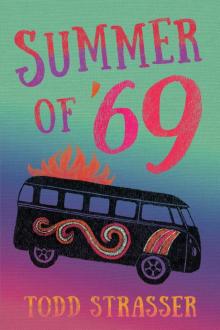 Summer of '69
Summer of '69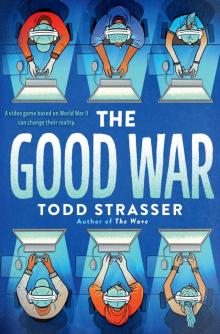 The Good War
The Good War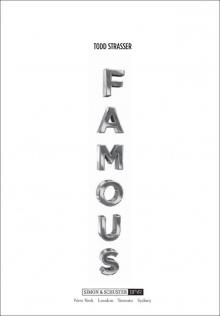 Famous
Famous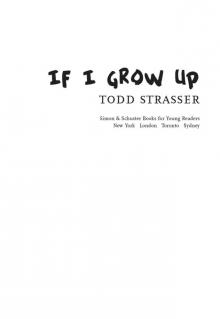 If I Grow Up
If I Grow Up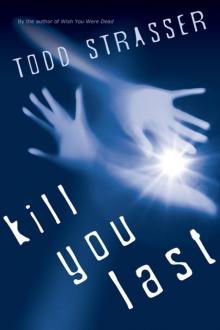 Kill You Last
Kill You Last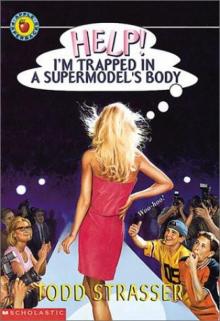 Help! I'm Trapped in a Supermodel's Body
Help! I'm Trapped in a Supermodel's Body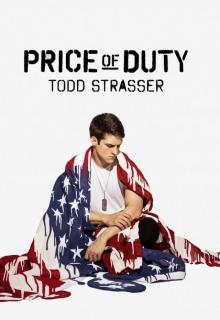 Price of Duty
Price of Duty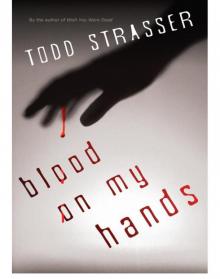 Blood on My Hands
Blood on My Hands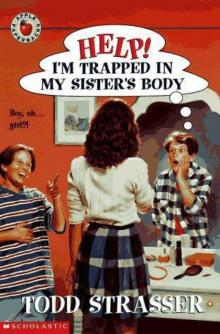 Help! I'm Trapped in My Sister's Body
Help! I'm Trapped in My Sister's Body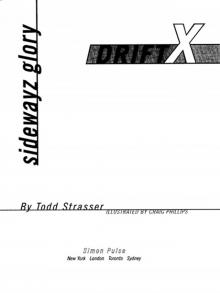 sidewayz glory
sidewayz glory The Beast of Cretacea
The Beast of Cretacea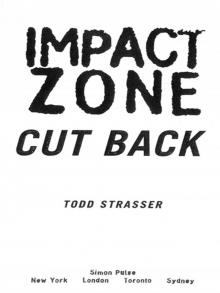 Cut Back
Cut Back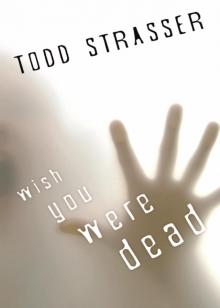 Wish You Were Dead
Wish You Were Dead The Wave
The Wave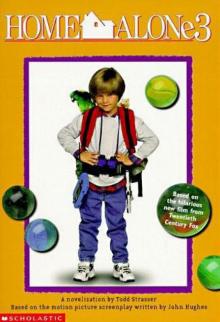 Home Alone 3
Home Alone 3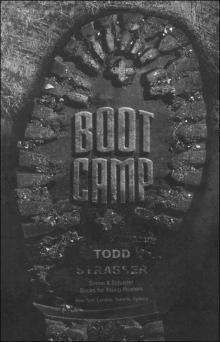 Boot Camp
Boot Camp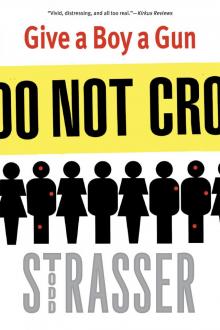 Give a Boy a Gun
Give a Boy a Gun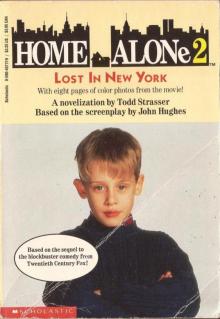 Home Alone 2
Home Alone 2 The Shore
The Shore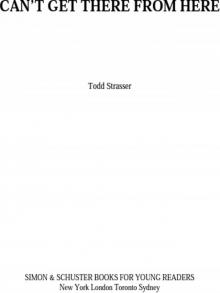 Can't Get There from Here
Can't Get There from Here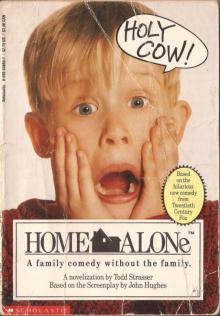 Home Alone
Home Alone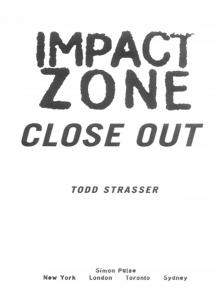 Close Out
Close Out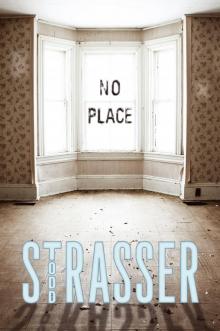 No Place
No Place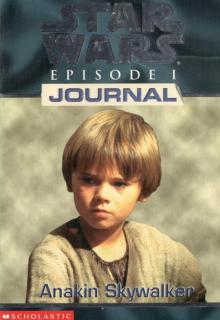 Star Wars - Episode I Journal - Anakin Skywalker
Star Wars - Episode I Journal - Anakin Skywalker